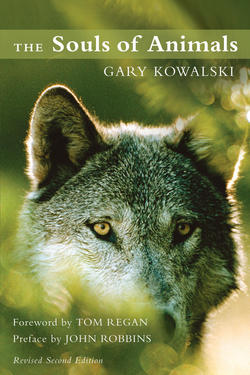Читать книгу The Souls of Animals - Gary Kowalski - Страница 10
На сайте Литреса книга снята с продажи.
ОглавлениеForeword
What a piece of work we humans are! So unsure are we of our place in the grand scheme of things, we even enlist our language to mask our cosmic angst. On one side of the semantic ledger we find the word animal; on the other side, the word human. That humans are animals, it seems, is a troubling fact we would like to forget. After all, no self-respecting human would want to be caught “acting like an animal.”
This denial of our animality has had predictable consequences. To begin with, it has nurtured centuries of ignorance about our brothers and sisters in fur, and feather, and fin. One rarely explores what one “knows” isn’t worth exploring in the first place. No one should be surprised, therefore, when (as is true of the dominant traditions in the western world) other-than-human animals are viewed as inferior beings having no purpose beyond serving the interests of the master species: Homo sapiens. Chimpanzees belong in biomedical research labs, don’t they? A pig’s reason for being is as ham, between two slices of bread, isn’t it? What could be clearer than that?
Part of the strength of the restrained, graceful words we read on these pages can be traced to Gary Kowalski’s gentle yet resolute assault on this shameful record of our species’ hubris. What place does our vaunted “superiority” have when we read that gorillas grieve the loss of friends; elephants attempt to comfort kin who are dying; young birds need to be taught what to sing; African wild dogs risk their own lives to save that of a pup; dolphins, orcas, and whooping cranes frolic for the sheer fun of it; and both geese and jackdaws mate for life?
Because we have viewed other animals through the myopic lens of our self-importance, we have misperceived who and what they are. Because we have repeated our ignorance, one to the other, we have mistaken it for knowledge. It takes no special training to recognize how little one knows. It does take a special kind of wisdom to acknowledge and overcome it. As he demonstrates on every page of this book, Gary Kowalski is among the very few who are wise.
Earlier, I noted that our species’ hubris has infected how we understand other animals. Not surprisingly, our shared arrogance has also encouraged widespread misconceptions about who and what we are. Steeped in the traditions of denial, we humans have wanted to view ourselves as being in the world, but not of it—alive within the larger community of life, but not an equal member in it.
If Gary Kowalski has his way, this all-too-familiar fantasy will not long endure. Since other-than-human animals really are so much like us, how can we be so much better than they? Since they not only are in the world, but of the world, how can we plausibly continue to view ourselves as apart from, not as a part of, the city of life?
“We are the youngest siblings in life’s family—the perpetual neonates of the animal world,” Gary Kowalski writes near this book’s end. “In a fundamental way we need other creatures to tell us who we are.” Whether or not we learn from these, our neglected tutors, this much we know: all animals are fortunate to have Gary Kowalski as our shared ambassador, creating the cognitive space in which other animals can speak the truths they know, preparing the spiritual place for us to hear them.
—TOM REGAN
PUBLISHER’S NOTE:
Tom Regan is a Professor and Department Head for the Department of Philosophy and Religion at North Carolina State University.
